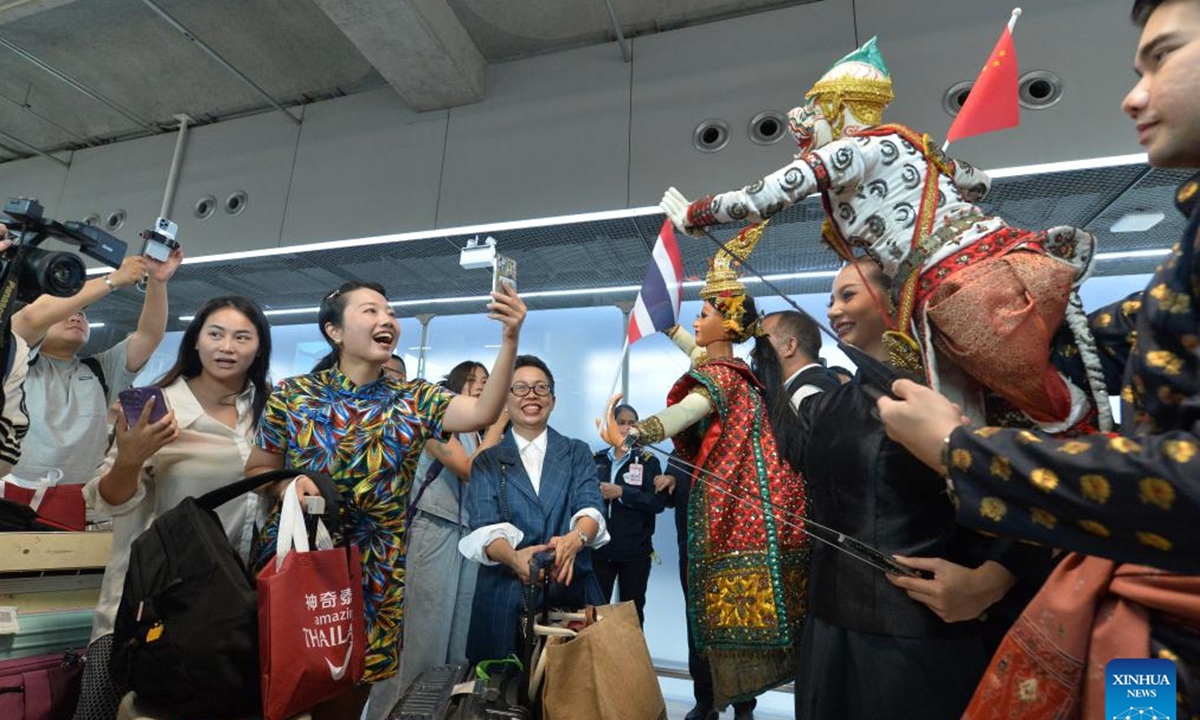
Staff members welcome Chinese tourists at Suvarnabhumi airport in Bangkok, Thailand, Sept. 25, 2023. Thailand extended a warm welcome to the first batch of visa-exempt flights from China on Monday, marking the launch of the nation's fresh initiative to reinvigorate its Chinese tourist market. (Photo: Xinhua)
Thai Prime Minister Srettha Thavisin recently announced that Thailand and China will sign a visa exemption agreement. Starting March 1, citizens of Thailand and China can travel between the two countries without a visa, with a maximum stay of 30 days. On Thursday, China and Singapore also signed a mutual visa exemption agreement, which will officially take effect on February 9. As a result, the three countries on the Southeast Asian golden tourist route - Singapore, Malaysia, and Thailand - have all exempted Chinese citizens from visa requirements.
It was noticed that in recent months, China has actively promoted a wave of "visa exemptions." So far, China has concluded visa exemption agreements with 157 countries covering different types of passports, simplified visa procedures with 44 countries, and achieved comprehensive mutual visa exemption with 22 countries. In addition, more than 60 countries and regions provide visa-free or visa-on-arrival convenience to Chinese citizens. China's door to the outside world is opening wider and wider, and more and more countries are recognizing the huge opportunities brought by China's opening-up.
There was a time in Chinese society when it was believed that, compared with the passports of China's Hong Kong and Macao regions, and many developed Western countries, the Chinese passport had a notable gap in terms of convenience of travel and international recognition. This is the first layer of basic fact. China is still a developing country, and developed countries generally have stricter visa requirements for passports of developing countries. With the further development of China's economy and the improvement of people's living standards, more and more countries will exempt Chinese citizens from visas, the "value" of Chinese passports will continue to rise. This is the second layer of fact and the future trend.
In the past few months, China has implemented a unilateral visa-free policy for countries such as France, Germany and Italy, with the aim of further facilitating people-to-people exchanges and promoting business activities. Some argue that China will be at a "disadvantage," and certain foreign media have even speculated about potential "political motives," claiming that "China is loosening visa restrictions to signal which countries are its diplomatic VIPs" and "rebuilding goodwill" with these countries. It must be said that such notions are too narrow-minded. In its commitment to opening-up, China is not hesitant about being the first to demonstrate sincerity. By minimizing the difficulties and obstacles for people from these countries to come to China, it aims to showcase itself as open and inclusive, and this drive is unceasing.
The measures of China's convenient visa policy are, in fact, a "two-way travel" for many countries as well. As early as September last year, Thailand took the lead in unilaterally exempting Chinese tourists from visas. After China successively introduced visa facilitation policies for some countries, the French government announced that Chinese holders of master's degrees acquired in France can obtain a five-year visa; Switzerland will provide more visa convenience for Chinese citizens and Chinese companies investing in Switzerland; and Ireland expressed its willingness to actively consider providing more convenience for Chinese citizens visiting Ireland. The expansion of visa reciprocity policies will do much to promote exchanges between China and relevant countries.
It is worth mentioning that in the past, some foreign opinions often compared Chinese passports with those of certain developed countries or regions. In reality, the convenience of a passport is primarily associated with a country's economic development and per capita income level, rather than just the openness or international popularity of the country. It is a dynamic and phased issue. Now, it is clear that as China's comprehensive strength continues to rise, coupled with increasing global recognition of China's overall development, the continuous improvement in the "value" of the Chinese passport is a significant trend.
The convenience of visas is a very tangible benefit that ordinary people enjoy as a result of China's high-level opening-up. On the announcement of the visa exemption between China and Singapore, the real-time search popularity for Singapore surged on the Ctrip travel platform. At the same time, data shows that the search popularity for China-related keywords among Singaporean tourists has increased by over 20 percent compared to the previous month. With the upcoming Chinese New Year, the visa exemption policy is a New Year's gift given by China and Singapore to their people of both countries. Whether it's interconnection between nations or mutually beneficial cooperation, people are the most fundamental element. With people acting as the link, cooperation between China and relevant countries will be further enhanced.




